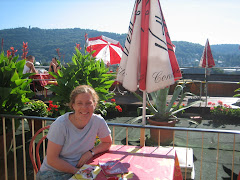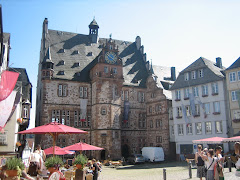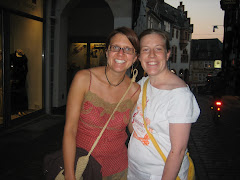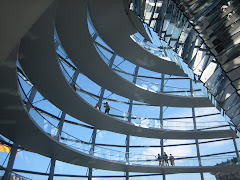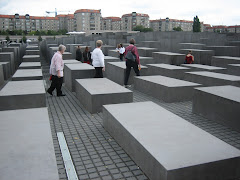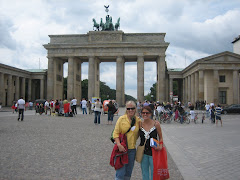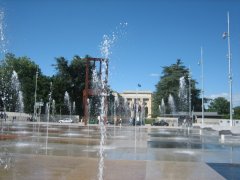Thanks to everyone for your support and well wishes this summer!
I returned home and am happy to announce that I have a new position working with the Minnesota State Colleges and Universities government relations team. It is so great to be back with my wonderful co-workers and serving in a job that is a passion of mine! I have also joined in on my classes at Humphrey Institute.
I look forward to catching up with all of my friends and family here. I also want to send a special thank you to my Swiss family! I had a great experience because of you!
Sunday, September 30, 2007
Friday, September 7, 2007
Military and peace
Soldier and peace, a bit like oil and water when you first think about it, but very fitting and very important to the peacebuilding process.
During this course, I have been very thankful to Major Ralf Lünsmann, who has taught me so much about the military's role in peacebuilding. A common task in our course is to break out into team syndicates and work on a problem together. While the groups are meeting, I have been able to learn from Ralf. He is a major in the Swiss military and teaches geography when he not serving. He has been deployed on three peacekeeping missions around the world.
Ralf taught me that there are two major military components to a United Nations peacekeeping mission. The military observers watch the areas to make sure that conflict will not break out and that local militias are abiding by the ceasefire agreement. These observers are unarmed and also travel into local villages to establish rapport with mayors and community leaders. They work together to monitor any potential uprisings and share information. The other military group is the general military presence. When the United Nations calls for a peace agreement, the number of troops to serve is established. UN ambassadors can volunteer their country for this role. Many times, the joint group is made up of armies from many different countries. All of these men fall under the rule of a force commander, who is appointed by the United Nations. This supervisor usually comes from the country that sends the most troops.
Overall, soldiers have a very important role in the peacebuilding process. The military can help build up roads that were destroyed during the conflict which can transport supplies. Likewise, the military doctors can assist at local hospitals. Soldiers can move supplies, bring relief aid to displaced people, and/or help rebuild homes. The roles for military in peacebuilding are truly endless!
Thanks to all of the soldiers out there who aid in these types of situations!
During this course, I have been very thankful to Major Ralf Lünsmann, who has taught me so much about the military's role in peacebuilding. A common task in our course is to break out into team syndicates and work on a problem together. While the groups are meeting, I have been able to learn from Ralf. He is a major in the Swiss military and teaches geography when he not serving. He has been deployed on three peacekeeping missions around the world.
Ralf taught me that there are two major military components to a United Nations peacekeeping mission. The military observers watch the areas to make sure that conflict will not break out and that local militias are abiding by the ceasefire agreement. These observers are unarmed and also travel into local villages to establish rapport with mayors and community leaders. They work together to monitor any potential uprisings and share information. The other military group is the general military presence. When the United Nations calls for a peace agreement, the number of troops to serve is established. UN ambassadors can volunteer their country for this role. Many times, the joint group is made up of armies from many different countries. All of these men fall under the rule of a force commander, who is appointed by the United Nations. This supervisor usually comes from the country that sends the most troops.
Overall, soldiers have a very important role in the peacebuilding process. The military can help build up roads that were destroyed during the conflict which can transport supplies. Likewise, the military doctors can assist at local hospitals. Soldiers can move supplies, bring relief aid to displaced people, and/or help rebuild homes. The roles for military in peacebuilding are truly endless!
Thanks to all of the soldiers out there who aid in these types of situations!
Tuesday, September 4, 2007
Peacebuilding 101
I am here in Spiez, Switzerland. The participants have arrived for the peacebuilding course!
Their first task was to break into four groups of 6. Each team was given a radio and a map. Our local military guru from the Swiss military, Ralf Lünsmann, manned the radios and communicated with each team on locations. The teams needed to find their way from the start to 3 different check points. At each stop, participants had to complete a group task. First, they walked on a plank together as a team and rode a pink Barbie bike with a skiddish wheel. At check point 2, where I was located, the teams had to start a fire with one match, boil water, put up a tent and get all teammates inside. The fastest team did this in 5 minutes. Can you imagine? Finally, the groups had to work together with planks and rocks to cross a "crocodile infested" river. It was great fun and a wonderful icebreaker.
Today, they have been learning conflict mediation. This is very similar to the training that I had as a resident assistant in Maple Hall. Yesterday, they began to lay out the fictious conflict "Mikeland," a project I have been editing and working on all summer long. It is great to see the end results!
On a different note, I have been able to reflect on this summer as I prepare a paper for class back home. It is very fruitful to see all that I have learned in the three months that I have been in Geneva. From learning about health care with my family of doctors, to learning about the United Nations during my courses and history during my travels, this definitely is an experience I will not forget!
Their first task was to break into four groups of 6. Each team was given a radio and a map. Our local military guru from the Swiss military, Ralf Lünsmann, manned the radios and communicated with each team on locations. The teams needed to find their way from the start to 3 different check points. At each stop, participants had to complete a group task. First, they walked on a plank together as a team and rode a pink Barbie bike with a skiddish wheel. At check point 2, where I was located, the teams had to start a fire with one match, boil water, put up a tent and get all teammates inside. The fastest team did this in 5 minutes. Can you imagine? Finally, the groups had to work together with planks and rocks to cross a "crocodile infested" river. It was great fun and a wonderful icebreaker.
Today, they have been learning conflict mediation. This is very similar to the training that I had as a resident assistant in Maple Hall. Yesterday, they began to lay out the fictious conflict "Mikeland," a project I have been editing and working on all summer long. It is great to see the end results!
On a different note, I have been able to reflect on this summer as I prepare a paper for class back home. It is very fruitful to see all that I have learned in the three months that I have been in Geneva. From learning about health care with my family of doctors, to learning about the United Nations during my courses and history during my travels, this definitely is an experience I will not forget!
Wednesday, August 29, 2007
Some European (and Swiss) lessons
As I near the end of the experience, I have been reflecting on lessons I have learned. There are many take-aways from this summer that will stick with me.
1) While cars are helpful, they are not necessary every day. The US MUST do a better job of increasing public transportation-buses, trams, maybe even trains to other cities.
2) Be environmentally friendly-recycle and reuse.
3) Produce is so much better if it is fresh! Nearly every Swiss family has a fruit tree and/or a vegetable garden. You cannot beat the taste! Plus it is "free," just the labor!
4) Every item of clothing does not need to be dried. Europeans hang most if not all of their clothes. Just think of the energy savings this could bring!
5) While air conditioning is a gift, you can live without it. Sleeping with the window open and rain falling is very soothing. I plan to shut mine off more often.
1) While cars are helpful, they are not necessary every day. The US MUST do a better job of increasing public transportation-buses, trams, maybe even trains to other cities.
2) Be environmentally friendly-recycle and reuse.
3) Produce is so much better if it is fresh! Nearly every Swiss family has a fruit tree and/or a vegetable garden. You cannot beat the taste! Plus it is "free," just the labor!
4) Every item of clothing does not need to be dried. Europeans hang most if not all of their clothes. Just think of the energy savings this could bring!
5) While air conditioning is a gift, you can live without it. Sleeping with the window open and rain falling is very soothing. I plan to shut mine off more often.
Monday, August 27, 2007
The final five...
This is my last week in Geneva. I had the day off and went to Yvoire, France on the boat. It was so nice, just what I needed- a day on the lake in the sun! I am now down to my final five days in this international city.
This weekend, I leave for the peacebuilding course. The complete reason I am in Geneva. I am so excited for it to begin! We will have 25 participants in the course, literally from all places around the world. Each has a different background and all bring various experiences. Some were former police men, some are border guards, others work for their countries' department of foreign affairs, or heads of state. We also have participants in the United Nations. I am excited to learn from each of them!
Part of the training will be in the forest. We will simulate situations that peacekeepers experience in the field. Although, this is meant to be a surprise, so I will have to tell you after it happens. Being a policy geek, it will be a great change to live out the "peacekeeper" lifestyle and see what happens when people work in post-conflict settings. More soon!
This weekend, I leave for the peacebuilding course. The complete reason I am in Geneva. I am so excited for it to begin! We will have 25 participants in the course, literally from all places around the world. Each has a different background and all bring various experiences. Some were former police men, some are border guards, others work for their countries' department of foreign affairs, or heads of state. We also have participants in the United Nations. I am excited to learn from each of them!
Part of the training will be in the forest. We will simulate situations that peacekeepers experience in the field. Although, this is meant to be a surprise, so I will have to tell you after it happens. Being a policy geek, it will be a great change to live out the "peacekeeper" lifestyle and see what happens when people work in post-conflict settings. More soon!
Monday, August 20, 2007
Saying goodbye
The adventure is slowly coming to an end. This summer, I have met many amazing people and think I have made some life-long friends! There were 40 students on the Duke program and it seems that every week there is another goodbye party for another person that is leaving. This is a weird balance for me, as I still have a month of my time in Switzerland left!
As always, I have found many fun new things to keep busy. In the recent weeks, I went out to a karaoke bar and sang for the 30th anniversary of Elvis's death. This weekend, I went on the boat with friends and enjoyed some Swiss shopping. Of course, we have also been eating-Lebanese, Chinese and Ethiopian food last week!
A new fun event has been joining a local trivia team at the British pub, Pickwicks. This is a great place in Geneva. Although I do not really care for hamburgers back home, this is a great treat to have in Switzerland, and a Pickwicks burger is ideal! (Most Swiss dishes contain minimal meat-perhaps some sausage or meat in a hot dish. Even sandwiches are sparse with one very thin cut piece of meat. The carnivore in me cries out! Mom and dad-steak when I return?!?) Thus, meat at Pickwicks is a treat! You also cannot beat the fries there.
Last week, our trivia team took third place which earned us each one free drink. (Tonight, I have invited my host sisters and their boyfriends for night out of trivia.) It should be a smashing good time!
For your reading enjoyment (and to test your knowledge), try answering a few of these questions that I got right:
1) Which animated family was the first to sleep in the same bed?
2) Elvis was known for using this muscle, the levator labii superioris, often. For what did he use it?
3) The term "Deep Throat" was made famous in the political arena. Why?
4) What is the name of the family that Mary Poppins works for?
5) The muscles are connected to the bones by what?
6) Which feline chased Tweety?
7) What is the term for diseases where one uncontrollably falls asleep?
8) What is the name of the girl that wears glasses in Scooby Doo?
And, just to make it an even 10, here are two more which I did not know....
9) Who is the French President?
10) Where is the Rock and Roll Hall of Fame and Museum located?
As always, I have found many fun new things to keep busy. In the recent weeks, I went out to a karaoke bar and sang for the 30th anniversary of Elvis's death. This weekend, I went on the boat with friends and enjoyed some Swiss shopping. Of course, we have also been eating-Lebanese, Chinese and Ethiopian food last week!
A new fun event has been joining a local trivia team at the British pub, Pickwicks. This is a great place in Geneva. Although I do not really care for hamburgers back home, this is a great treat to have in Switzerland, and a Pickwicks burger is ideal! (Most Swiss dishes contain minimal meat-perhaps some sausage or meat in a hot dish. Even sandwiches are sparse with one very thin cut piece of meat. The carnivore in me cries out! Mom and dad-steak when I return?!?) Thus, meat at Pickwicks is a treat! You also cannot beat the fries there.
Last week, our trivia team took third place which earned us each one free drink. (Tonight, I have invited my host sisters and their boyfriends for night out of trivia.) It should be a smashing good time!
For your reading enjoyment (and to test your knowledge), try answering a few of these questions that I got right:
1) Which animated family was the first to sleep in the same bed?
2) Elvis was known for using this muscle, the levator labii superioris, often. For what did he use it?
3) The term "Deep Throat" was made famous in the political arena. Why?
4) What is the name of the family that Mary Poppins works for?
5) The muscles are connected to the bones by what?
6) Which feline chased Tweety?
7) What is the term for diseases where one uncontrollably falls asleep?
8) What is the name of the girl that wears glasses in Scooby Doo?
And, just to make it an even 10, here are two more which I did not know....
9) Who is the French President?
10) Where is the Rock and Roll Hall of Fame and Museum located?
Monday, August 13, 2007
Make new friends, but keep the old
Last weekend, I traveled to Germany and visited old friends. First, I saw Erin Doering, my sister's best grade school friend. She is now living in Berlin and will be there for one year teaching at an international school. Erin was recently married and is beginning the excursion with her husband, Patrick. What a cool way to spend your first year as a married couple! My second stop was seeing Conni Rober, an exchange school friend that came to Litchfield High School. The experiences reminded me that friendships really do span the world! In my opinion, there is nothing better than catching up with old friends half-way around the world.
I was literally the first visitor that Erin and Patrick had. They moved in their apartment 2 days before I arrived. I was thankful they would take me in. It was also very nice as Erin and I got to experience the city together. And, what a story Berlin has to tell! First, we went to the Berlin gate, which at one time was the passageway between east and west Berlin. We saw the Russian memorial museum, which was built out of the stone from Hitler's bunker. The most moving part was the newly constructed Jewish memorial, reminding of all of the lives lost in the Holocaust. There were thousands of stone blocks that visitors walked among. The blocks started out small, about a foot off the ground. As the visitors went further into the memorial, the blocks became taller. So tall, you got lost inside of them. Looking down the rows, each block was aligned. It made me think of the rows of beds in the concentration camps. The whole experience also reminded me how powerful a person can be in the beginning of a conflict. One individual can stand up against the violence and maybe stop it. However, as the Holocaust went on, an individual became lost in the chaos. As much as a person wanted to speak out against the murders, their voices became very small. I was really moved visiting this memorial.
Underneath the memorial was a museum for the victims. This also carried a strong message. The first quote on the wall said "It happened, therefore it can happen again: this is the core of what we have to say." The museum followed victims' lives. It showed the hope of children, married couples, and grandparents. Later their lives were snuffed out in the concentration camps. It saddened me to the core. I thought of all of the hope, potential and dreams that was lost in these violent acts. The museum also showcased letters written by people in the camps- from those that unloaded the train cars and administer gas in the chambers to those that burned the bodies. Each letter showed terror about the jobs they were given. This is one viewpoint that I had not seen until this time. The experience made me reflect...
Working on peace studies this summer, I had the opportunity to attend a meeting on post-conflict studies. It was a round table discussion on how to move a society forward after war. The participants said that history books must carry strong messages of the truth. As you can imagine, some countries want to bury the ugly, hatred of war, conflict and death. However, in order to learn, the participants said that future generations must learn the truth so the atrocities never happen again. I think that this is an important responsibility that we all must carry.
... the city of Berlin seemed to do this well. My last morning there, I went to the federal government center. Here, I saw the hope for the future. The building was historic and represented the past. However, a new glass dome was added. Visitors could climb around the walkway of the dome and look down over where parliament meets. It was neat to see how the city has bridged the past with hope for the future.
Moving onto Marburg, I saw my friend Conni! We spent a day in her life. It was so nice! We had ice cream (vanilla with warmed berries- a local favorite) with her son Mathis, walked the city, visited the local clock tower and castle. She also showed me her campus. Unbeknown to us, we completing the same studies and degree! It was fun to compare notes and catch up on life! We also had many of Conni's favorite things. She shared cinnamon, fig tea and her mom's home-made jam. Oh, it was wonderful! For dinner, we went out to a local pub (she ordered me local pasta with peas, mushrooms and ham in a creme sauce) and then had a drink at the coffee bar. The city was just as I had imagined - the cute little streets were just like the photos I saw in German class. We also took a walk by the river and had breakfast (salmon, champagne, bread, and jams) overlooking the mountain. Saying goodbye was difficult for both of us. We were all teary-eyed and vowed that we must visit more often. There is nothing like catching up with old friends!
I was literally the first visitor that Erin and Patrick had. They moved in their apartment 2 days before I arrived. I was thankful they would take me in. It was also very nice as Erin and I got to experience the city together. And, what a story Berlin has to tell! First, we went to the Berlin gate, which at one time was the passageway between east and west Berlin. We saw the Russian memorial museum, which was built out of the stone from Hitler's bunker. The most moving part was the newly constructed Jewish memorial, reminding of all of the lives lost in the Holocaust. There were thousands of stone blocks that visitors walked among. The blocks started out small, about a foot off the ground. As the visitors went further into the memorial, the blocks became taller. So tall, you got lost inside of them. Looking down the rows, each block was aligned. It made me think of the rows of beds in the concentration camps. The whole experience also reminded me how powerful a person can be in the beginning of a conflict. One individual can stand up against the violence and maybe stop it. However, as the Holocaust went on, an individual became lost in the chaos. As much as a person wanted to speak out against the murders, their voices became very small. I was really moved visiting this memorial.
Underneath the memorial was a museum for the victims. This also carried a strong message. The first quote on the wall said "It happened, therefore it can happen again: this is the core of what we have to say." The museum followed victims' lives. It showed the hope of children, married couples, and grandparents. Later their lives were snuffed out in the concentration camps. It saddened me to the core. I thought of all of the hope, potential and dreams that was lost in these violent acts. The museum also showcased letters written by people in the camps- from those that unloaded the train cars and administer gas in the chambers to those that burned the bodies. Each letter showed terror about the jobs they were given. This is one viewpoint that I had not seen until this time. The experience made me reflect...
Working on peace studies this summer, I had the opportunity to attend a meeting on post-conflict studies. It was a round table discussion on how to move a society forward after war. The participants said that history books must carry strong messages of the truth. As you can imagine, some countries want to bury the ugly, hatred of war, conflict and death. However, in order to learn, the participants said that future generations must learn the truth so the atrocities never happen again. I think that this is an important responsibility that we all must carry.
... the city of Berlin seemed to do this well. My last morning there, I went to the federal government center. Here, I saw the hope for the future. The building was historic and represented the past. However, a new glass dome was added. Visitors could climb around the walkway of the dome and look down over where parliament meets. It was neat to see how the city has bridged the past with hope for the future.
Moving onto Marburg, I saw my friend Conni! We spent a day in her life. It was so nice! We had ice cream (vanilla with warmed berries- a local favorite) with her son Mathis, walked the city, visited the local clock tower and castle. She also showed me her campus. Unbeknown to us, we completing the same studies and degree! It was fun to compare notes and catch up on life! We also had many of Conni's favorite things. She shared cinnamon, fig tea and her mom's home-made jam. Oh, it was wonderful! For dinner, we went out to a local pub (she ordered me local pasta with peas, mushrooms and ham in a creme sauce) and then had a drink at the coffee bar. The city was just as I had imagined - the cute little streets were just like the photos I saw in German class. We also took a walk by the river and had breakfast (salmon, champagne, bread, and jams) overlooking the mountain. Saying goodbye was difficult for both of us. We were all teary-eyed and vowed that we must visit more often. There is nothing like catching up with old friends!
Subscribe to:
Posts (Atom)
